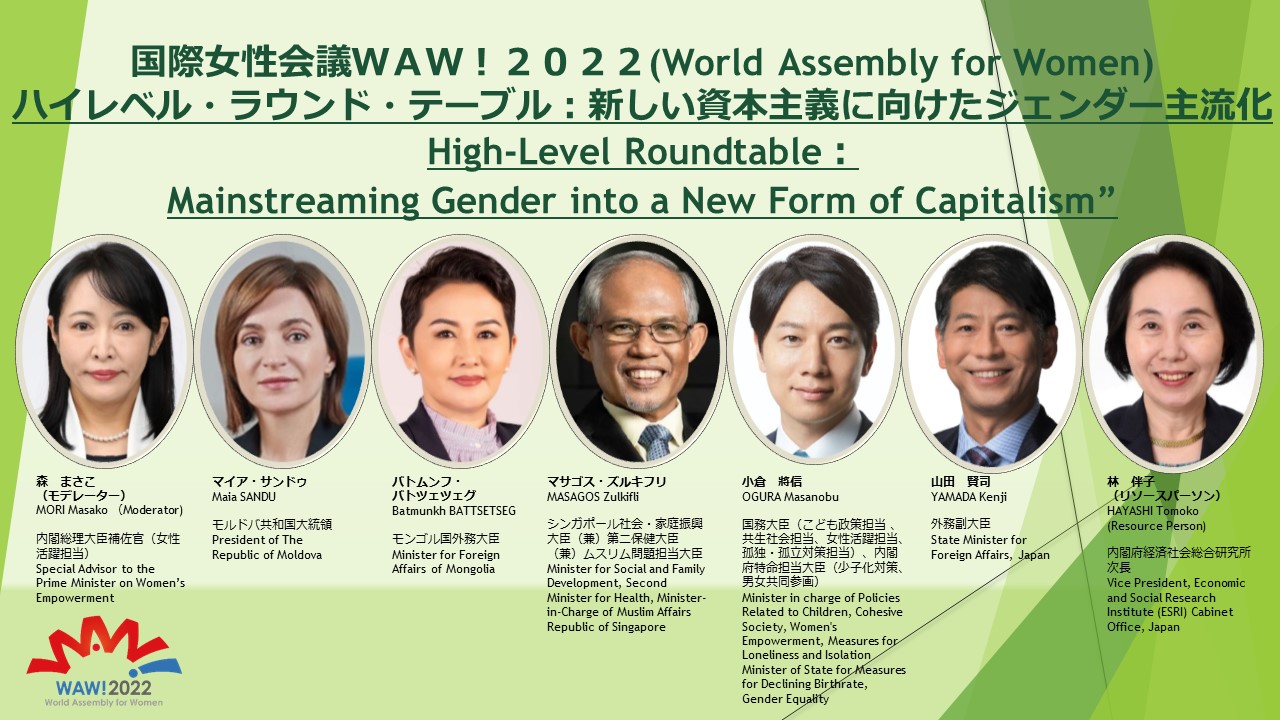Women's Empowerment and Gender Equality
World Assembly for Women: WAW! 2022
Concept Note
Mainstreaming Gender into a New Form of Capitalism
Participants (Regularly Updated)

- MORI Masako, Special Advisor to the Prime Minister of Japan on Women’s Empowerment (Moderator)
- Maia SANDU, President of The Republic of Moldova
- Batmunkh BATTSETSEG, Minister for Foreign Affairs of Mongolia
- MASAGOS Zulkifli, Minister for Social and Family Development, Second Minister for Health and Minister-in-charge of Muslim Affairs Republic of Singapore
- OGURA Masanobu, Minister in charge of Policies Related to Children, Cohesive Society, Women's Empowerment, Measures for Loneliness and Isolation, Minister of State for Measures for Declining Birthrate, Gender Equality
- YAMADA Kenji, State Minister for Foreign Affairs, Japan
- HAYASHI Tomoko, Vice President, Economic and Social Research Institute (ESRI) Cabinet Office (Resource Person)
Current situation and challenges to be discussed
The international community attaches importance on "gender mainstreaming," which seeks to reflect the perspective of gender equality in all policies and institutions. For example, in the G7 and G20, women's participation in decision-making and gender responsive measures in various fields such as the environment, climate change, energy, finance, and public security is constantly discussed. In addition, "human rights due diligence" has become a global trend, which is an attempt to identify, prevent, and mitigate risks of human rights violations, including women's rights, in corporate activities. Why is such a perspective necessary?
First, let us consider the problems we face today. For example, think of the impact of the COVID-19 pandemic. One of the challenges is the increase in gender-based violence, also known as the "shadow pandemic," which has been reported in a wide range of countries. In addition, the service sector has been hit hard, leading to a significant impact on women's employment. It also highlighted the high risk of infection and health insecurity among female essential workers in healthcare, nursing, and other fields. In addition, the countless acts of brutality by Russian soldiers during Russia’s aggression against Ukraine brought renewed focus on the violence against women during conflict. It is estimated that among the large number of displaced Ukrainians due to the aggression, 90% are women and children(note1).
Recognizing the vulnerability of women in such context, it is essential to apply their perspectives to policies and systems in order to realize a "society in which everyone can live comfortably" post-COVID. Many good practices have been reported in corporate activities as well, as companies achieved better performance by incorporating diverse perspectives, including into their working styles. In this sense, solving problems from a gender perspective is also a key to solving various problems in society as a whole.
The "New Form of Capitalism" that the Kishida Administration has proposed is based on a "virtuous cycle of growth and distribution”. In other words, growth generates resources that can be distributed, and distribution increases demand, which in turn strengthens the growth potential of the economy and leads to the next stage of growth(note2). In addition, "women's economic independence" is at the core of the "New Form of Capitalism”. Without the foundation for women's economic independence, a virtuous cycle of growth and distribution cannot be created. Through "gender mainstreaming," diversity will create more "growth," and the resources from that growth will be distributed in consideration of the rights of all people, including women, which will lead to further growth. If such a virtuous cycle is created, it will contribute to the realization of a peaceful and stable society in which everyone can feel a sense of fulfillment in life.
From this perspective, the WAW!2022 will focus on "a New Form of Capitalism and Women". From the viewpoint of a "virtuous cycle of growth and distribution," we will discuss the relationship between women and digital/STEM education, the meaning of women’s entrepreneurship, closing the gender wage gap, women's participation in a decarbonized society, and measures to realize a society that protects the dignity and pride of women. In addition, the relationship between women and disaster prevention will be discussed. Furthermore, women's participation in the decision-making process that runs through these issues will be explored in depth by discussing the increasing interest and involvement of men and youth in achieving gender equality, as well as women's participation in peace and security (WPS).
All of these issues, which seem to cover a wide range of topics, are fundamentally caused by the fact that we are still bound by stereotypes of what women and men should be like. It has been pointed out that these stereotypes also persist in rural areas, limiting the options for women who want to be economically independent.
How will a society based on a "New Form of Capitalism" that promotes "gender mainstreaming" in all aspects and is not bound by stereotypes change the world? What benefits will this bring to all, not only women but also men, to all members of society? At the WAW!2022, we would like to draw a new vision of our future, connecting Tokyo to the rest of Japan and the world, while taking into account the perspectives of the youth who will lead our future, as well as looking at various issues in rural areas.
Discussion Topics
- What kind of efforts are needed to promote "gender mainstreaming" by making society where shares the recognition that gender issues are not only women's issues, but are essential for building a better society, and by taking into consideration women’s intersectionality?
- What challenges are arising in rural areas? What efforts can be made to reduce the disparity between urban and rural areas?
- How should the voices of the youth, who will lead the next generation, be reflected in the creation of a peaceful and stable society based on a "New Form of Capitalism"?
- (note1) UN Women and Care International, “Rapid Gender Analysis of Ukraine”
 p.10
p.10 - (note2) 首相官邸、“未来を切り拓く「新しい資本主義」 成長と分配の好循環”
 (Japanese)
(Japanese)

